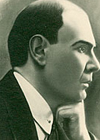Abbas Mirza Sharifzade
(1891 - 1938)

The most worthy successor of the Huseyn Arablinsky’s Romantic Style of Acting is an outstanding tragic actor, a great director, Abbas Mirza Sharifzade, who played a crucial role in the development of our cinema. He was born on March 9, 1891 in Shemakha, and when he was two years old, his family moved to Baku. His father Mirza Rasul Sharifzade worked as a teacher, and his mother Farrukhbeyim was a housewife.
Abbas Mirza, who received his first education at home, entered the second Russian-Tatar (i.e. Russian-Turkic) school on September 21, 1903.
Sharifzade studied here for three years, a year later entered the Alexander III gymnasium. However, his childhood illness did not allow him to continue his studies. He, with his elder brother Gulamrza Sharifzade, started trading and they went to theatre performances together. Like his peers, Abbas Mirza was amazed on Huseyn Arablinsky’s acting. And on that time a great love for acting skills arose in the heart of a young man, and in 1908, he first appeared on the stage as the Mute Girl in Molière’s “Le Médecin malgré lui”, prepared by a group of Muslim Drama Artists. Sharifzade, who forever linked his fate with the theatre, acted as an actor and director in the theatre groups of cultural and educational societies "Nijat", "Safa". In the first years of his acting career, in the announcements of performances his brother was titled as “Sharifzade-1” (Sharifov) and himself as “Sharifzade-2”.
On October 18, 1917, by that time, the already well-known master created the “Union of Muslim Actors”, and he himself became its chairman. There was created two-year course of actors in the Union, and it is considered the first sign of national theatre education.
Although Abbas Mirza Sharifzadeh worked for a short time in the Baku Theatre of Turkic Workers (1932) and at the film factory in the late 1920s, and in 1928 he was appointed chief director of the opera theatre, his work as a director, and mainly an actor, was directly connected with the National Theatre. He did a great job in presenting Azerbaijani performing arts in other countries. Under his leadership, our actors performed on tours in Iran (1914), Ashgabat (1917), Astrakhan (1918) and repeatedly in Tbilisi, Batumi and Yerevan.
Abbas Mirza Sharifzade was repressed in 1937 and was killed on November 16, 1938. In the 50s after the posthumous rehabilitation, in 1963 master’s 70th anniversary was held in a solemn ceremony. A street in Baku is named after him. The house of the actor, where once the Society was located, in which he was the chairman, is named after Abbas Mirza Sharifzade.